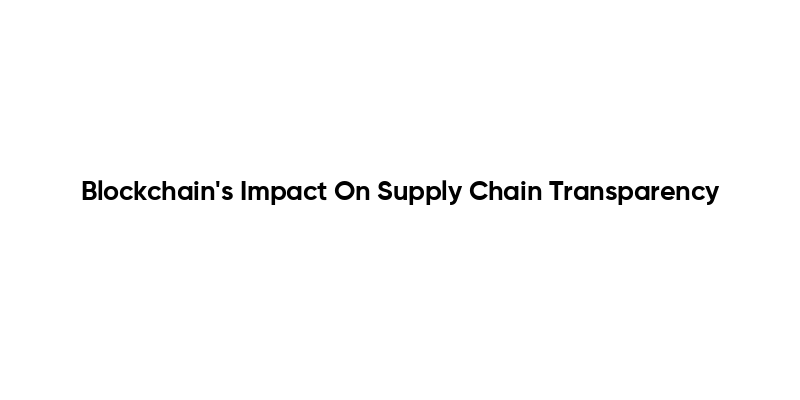In recent years, the term Blockchain’s Impact On Supply Chain Transparency has gained significant attention as businesses seek innovative solutions to enhance their operational efficiency. Blockchain technology, with its decentralized and immutable nature, offers a revolutionary approach to tracking products and transactions throughout the supply chain. By leveraging this technology, companies can ensure greater transparency, reduce fraud, and improve trust among stakeholders. This article delves into the profound implications of blockchain on supply chain management, highlighting its potential to transform traditional practices.
As you continue reading, you will discover how blockchain enhances traceability, allowing businesses to monitor the journey of products from origin to consumer. We will explore real-world examples of companies that have successfully implemented blockchain solutions to streamline their supply chains and increase accountability. Additionally, we will discuss the challenges and limitations of adopting blockchain technology, providing a balanced view of its impact on supply chain transparency.
Furthermore, this article will guide you through the future of supply chain management in the context of blockchain, examining emerging trends and technologies that complement this innovative approach. Whether you are a business leader, a supply chain professional, or simply curious about the intersection of technology and logistics, this exploration of blockchain’s impact on supply chain transparency promises to be both informative and engaging. Join us as we uncover the transformative power of blockchain in reshaping the landscape of supply chains.
Enhanced Traceability in Supply Chains
One of the most significant impacts of blockchain technology on supply chain transparency is enhanced traceability. By utilizing a decentralized ledger, every transaction and movement of goods can be recorded in real-time. This allows stakeholders to track the origin of products, ensuring that they meet quality and safety standards. For instance, in the food industry, blockchain can help trace the journey of produce from farm to table, reducing the risk of contamination and fraud.
Moreover, enhanced traceability fosters accountability among suppliers. When every participant in the supply chain can access the same information, it becomes easier to identify and address issues such as delays or discrepancies. This transparency not only builds trust among partners but also empowers consumers to make informed choices about the products they purchase.
Reducing Fraud and Counterfeiting
Blockchain technology plays a crucial role in combating fraud and counterfeiting in supply chains. By providing a secure and immutable record of transactions, blockchain makes it exceedingly difficult for counterfeit goods to enter the market. Each product can be assigned a unique digital identity, which is recorded on the blockchain, allowing for verification at any point in the supply chain.
This capability is particularly vital in industries such as pharmaceuticals and luxury goods, where counterfeit products can have severe consequences. By ensuring that only authentic products reach consumers, companies can protect their brand reputation and maintain customer trust. Additionally, the transparency offered by blockchain can deter potential fraudsters, knowing that their actions are easily traceable.
Streamlining Processes and Reducing Costs
Blockchain technology can significantly streamline supply chain processes, leading to reduced operational costs. Traditional supply chains often involve multiple intermediaries, each adding layers of complexity and cost. By implementing blockchain, companies can eliminate the need for intermediaries, as all transactions are recorded on a single, shared ledger accessible to all parties involved.
This simplification not only speeds up transactions but also reduces the likelihood of errors and disputes. With fewer intermediaries, companies can also save on transaction fees and administrative costs. As a result, businesses can allocate resources more efficiently, ultimately enhancing their bottom line.
Improving Collaboration Among Stakeholders
Blockchain fosters improved collaboration among supply chain stakeholders by providing a transparent platform for information sharing. With all parties having access to the same data, communication becomes more efficient, and decision-making is based on accurate, real-time information. This collaborative environment encourages innovation and responsiveness to market changes.
Furthermore, blockchain can facilitate smart contracts, which automatically execute agreements when predefined conditions are met. This feature enhances collaboration by ensuring that all parties adhere to the terms of the contract without the need for intermediaries. As a result, stakeholders can focus on building stronger relationships and driving value throughout the supply chain.
Enhancing Consumer Trust and Engagement
In today’s market, consumers are increasingly concerned about the origins and authenticity of the products they purchase. Blockchain technology enhances consumer trust by providing verifiable information about product sourcing and manufacturing processes. With the ability to trace a product’s journey through the supply chain, consumers can make informed decisions and support brands that align with their values.
Moreover, companies can leverage blockchain to engage consumers through transparency initiatives. By sharing blockchain data, brands can showcase their commitment to ethical practices, sustainability, and quality assurance. This level of transparency not only builds trust but also fosters brand loyalty, as consumers are more likely to support companies that prioritize integrity.
Future Trends in Blockchain and Supply Chain Transparency
The future of blockchain in supply chain transparency is promising, with several emerging trends poised to shape its evolution. One notable trend is the integration of Internet of Things (IoT) devices with blockchain technology. IoT sensors can provide real-time data on product conditions, such as temperature and humidity, which can be recorded on the blockchain for enhanced monitoring and compliance.
Additionally, as more companies adopt blockchain solutions, we can expect to see increased standardization across industries. This standardization will facilitate interoperability between different blockchain systems, allowing for seamless data sharing and collaboration. As these trends continue to develop, blockchain will play an increasingly vital role in creating transparent, efficient, and trustworthy supply chains.
Blockchain technology has emerged as a revolutionary tool for enhancing transparency in supply chains. By providing a decentralized and immutable ledger, blockchain enables all stakeholders to access real-time data regarding the movement of goods, thereby fostering trust and accountability.
| Aspect | Description |
|---|---|
| Decentralization | Blockchain eliminates the need for a central authority, allowing all parties in the supply chain to have equal access to information. |
| Immutability | Once data is recorded on the blockchain, it cannot be altered or deleted, ensuring the integrity of the information. |
| Traceability | Blockchain allows for the tracking of products from origin to consumer, making it easier to identify the source of issues such as contamination or fraud. |
| Smart Contracts | Automated contracts can be executed when certain conditions are met, streamlining processes and reducing the potential for disputes. |
| Cost Reduction | By increasing efficiency and reducing the need for intermediaries, blockchain can lower operational costs in supply chains. |
| Enhanced Collaboration | With shared access to data, stakeholders can collaborate more effectively, leading to improved decision-making and responsiveness. |
| Consumer Trust | Transparency in the supply chain can enhance consumer trust, as customers can verify the authenticity and ethical sourcing of products. |
In conclusion, the integration of blockchain technology into supply chains offers significant benefits in terms of transparency, efficiency, and trust. As more companies adopt this technology, the potential for improved supply chain management continues to grow.



